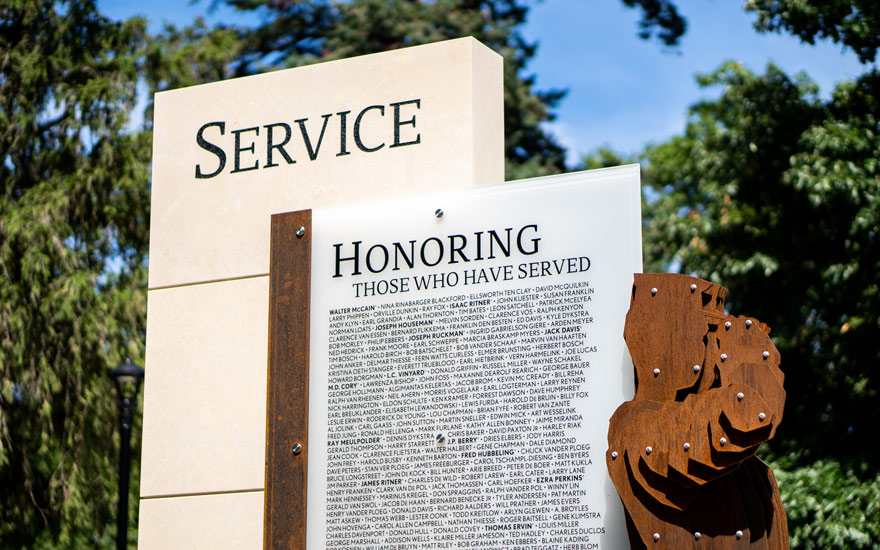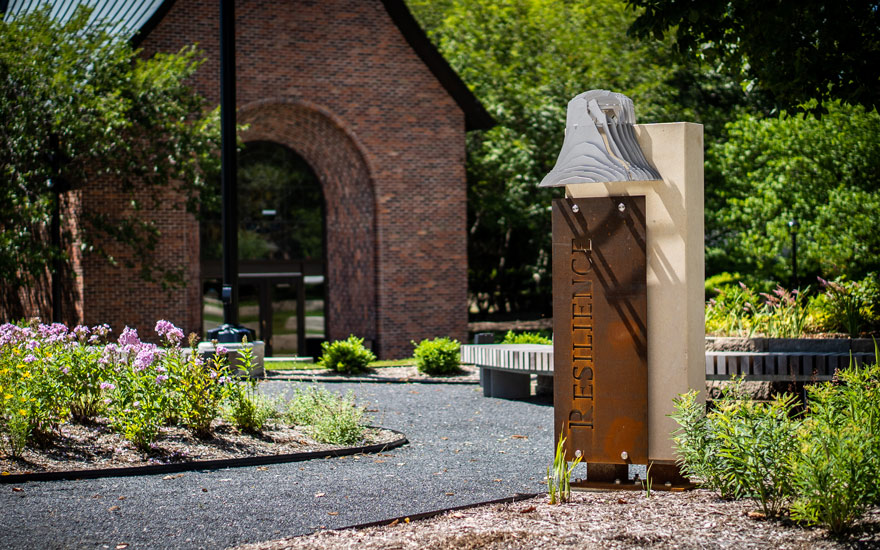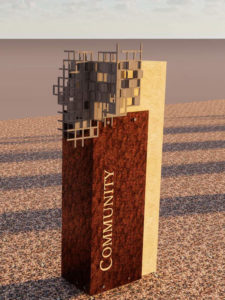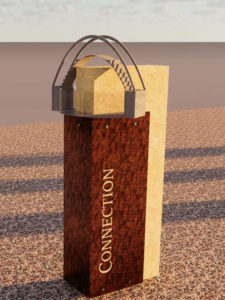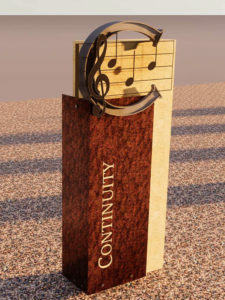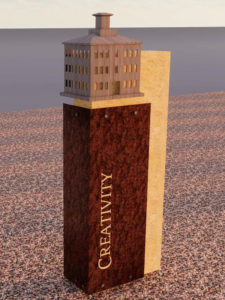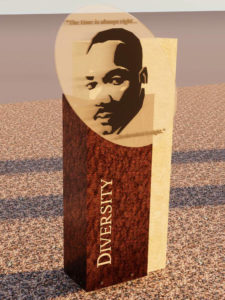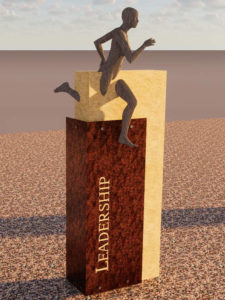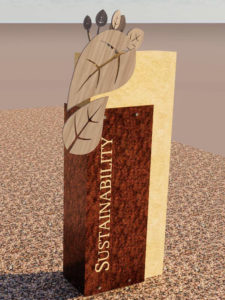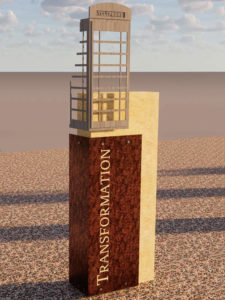History Markers
The history garden celebrates significant moments in the college’s history and the values at the core of its culture. There are 14 garden markers planned for the site, each commemorating an important milestone in the college’s past and principles fundamental to its future. Markers feature interpretive copy on etched glass plaques.
The markers are fabricated of Silverdale limestone, weathering steel, glass and stainless steel. The materials, colors and textures speak to the rich and diverse people and events that form Central College’s history.
Two of the markers are funded and installed. Central seeks funding for the additional markers so that the Peace Mall may continue to be a place that shows the never-ending connection alumni and students have to Central, forming a bond between past, present and future students and keeping the college’s history alive for generations to come.
Of the 14 planned garden markers in Central College’s history garden, 11 already have themes and important moments attached to them. Three more markers remain unnamed for now, leaving room for future decisions or three additional moments possibly yet to occur.
“It’s appropriate and respectful to honor the past as we prepare for the future,” said Central President Mark Putnam in 2020. “The markers articulate the values that founded and continue to guide the college and characterize its graduates.”
Service: Sentinels Veterans Marker
Completed in 2019
The Sentinels Veterans Marker anchors the east entrance to the history garden. The weathering steel cutouts are layers of the various uniformed servicemen or women of the five branches of our military.
Anchoring the garden, Service is a tribute to all Central alumni who have served our country in the armed forces. Two steel soldiers in full salute flank the entrance to the garden and large glass panels are etched with a roster of nearly 1,200 Central veterans.
This was the starting point to the project and the vision of lead donors Tom ’61 and Barb Gaard.
Each year, Central students enrolled in history courses research members of the Central family who have served our country and are named on the Sentinels Veterans Marker. This research honors our veterans and adds to our rich history.
Resilience
Completed in 2020
Tragedy struck the college in the early 20th century when the iconic Old Central building was destroyed by fire. One of the few relics salvaged from the ashes, the cracked Old Central Bell continues to symbolize the college’s resilience through difficult times.
The bell, cast in Troy, New York, first called Central students to classes in 1958. Josephine E. Thostenson, Central’s librarian, offered this colorful description of the bell:
“For 56 years its duties were numerous. At 5 a.m. it roused the sleeper for the morning study hour; it disturbed the sluggard, prodded the inactive or scolded the lazy. But it earned the gratitude of every student who measured time by its methodical strokes. Merrily it pealed a wedding chime, and slowly and sympathetically chanted and tolled for a funeral. It cried out in despair when the days of the college seemed numbered and rang with joy when orders came to ‘ring on.’ This bell became a fine old friend of the institution and developed a personality all its own.”
In 1914, the bell was silenced by lightning. When Old Central Hall burned to the ground in 1922, the bell was the only item recovered. Students from the Classes of 1924 and 1925 raised funds to mount the bell on a pedestal of Old Central’s foundation stones. Thostenson noted the bell bore “testimony to the spirit and traditions of Central’s past while living with the students of today.”
In 2020, Central’s Board of Trustees raised funds for the Resilience marker to be in the shape of the bell in in honor of Lanny Little ’74, board of trustee chair emeritus. Little served as Central’s board chair from 2011 to 2018. He has provided more than 30 years of service to Central’s board and supports Central in countless ways. He has served on many board committees and has supported Central’s mission of helping students discover and develop their greatest potential.
Community
The design for this marker is inspired by a Pella plat map from the time of Central’s founding. The intertwined grids illustrate the interdependence of Central and its home town throughout history and going forward. The campus will be indicated by an acrylic block that will glow at night.
Funding Needed
Contact development@central.edu for funding information.
Connection
The Central pond has been a beloved feature since it was created in the 1960s. When a bridge was built across the pond, it became a campus icon as well. The bridge is a perfect symbol for Central students’ lifelong connections with one another and with their community.
Funding Needed
Contact development@central.edu for funding information.
Continuity
For generations, the Central A Cappella Choir has shared a rich choral tradition with the college, state, country and world. This marker celebrates this history with a motif referencing a 1930s logo found on glee club beanies. The A Cappella Choir was founded in 1932 and is the oldest continuing music ensemble on campus.
Funding Needed
Contact development@central.edu for funding information.
Courage
The Reformed Church in America made a courageous move to purchase Central more than 100 years ago, likely saving the institution. Here, tree roots symbolize steadfastness in the face of adversity, and the ability of Central to adapt to any given condition throughout its history.
Funding Needed
Contact development@central.edu for funding information.
Creativity
A tribute to entrepreneurial creativity, this marker celebrates Central College Student Industries, which offered dual benefits of student training and college revenue. The building represented in the marker was crafted as a small keepsake by the student artisans of CCSI.
Funding Needed
Contact development@central.edu for funding information.
Diversity
In 1967, the Reverend Dr. Martin Luther King accepted Central President Don Lubbers’ invitation to keynote a community action symposium. Here, that milestone symbolizes Central’s commitment to fostering safety, respect and integrity among all members of the community. King’s words, “The time is always right to do what is right,” are inscribed on the marker.
Funding Needed
Contact development@central.edu for funding information.
Leadership
Women’s and men’s athletics are integrated into campus life, developing leaders as well as athletes. Student athletes have led Central to 11 NCAA Division Ill national team championships and that commitment to leadership is commemorated with the marker. President Emeritus Kenneth J. Weller authored the first Division III philosophy statement, which advocated the focus of intercollegiate athletics should be on benefits for the participant rather than the spectator, and that student-athletes be treated no differently than students involved in other cocurricular activities.
Funding Needed
Contact development@central.edu for funding information.
Sustainability
Sustainability leadership is a fundamental value at Central, both in campus operations and in academic endeavors. This commitment to green lifestyles is represented by leaves that align to form a footprint, reminding us to minimize our impact upon the earth.
Funding Needed
Contact development@central.edu for funding information.
Transformation
The British telephone booth found on campus represents Central’s study abroad program, started in 1965. At one time, more than 50 percent of Central students studied internationally prior to graduation. The program continues to evolve and today many students enjoy off campus programs, both domestic and international.
The telephone booth symbolizes connections across continents and celebrates this deeply held value of the college and the transformative effect of the experiences.
Funding Needed
Contact development@central.edu for funding information.
Unnamed
The three remaining markers are unnamed and available for funding. Contact development@central.edu for funding information.
